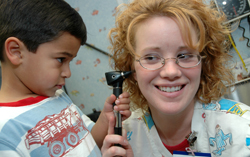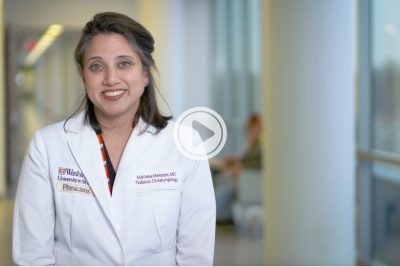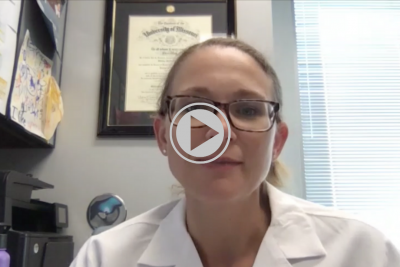I looked across the examination table at my son’s pediatrician in disbelief, a sinking feeling in my stomach. “This can’t be,” I thought to myself. “Really?” I said aloud. Stupid response.
“Want to see?” the doctor replied.
Yes! Oh, and he did have an infection. I wasn’t surprised, but didn’t want to believe I had missed it. This was a 6 month well check, emphasis on WELL. He didn’t have fever. He didn’t pull at his ears. He wasn’t fussy. He was eating. He always woke up at night, so that wasn’t a change. I felt like a failure both as a mom and a pediatrician as I held my son tightly. How did I not know?
Point #1: Don’t feel bad if you didn’t know. My partners have similar stories too!
An ear infection is not the end of the world and my son didn’t even seem sick. So why was I so upset? That is just the way motherhood works and that’s just the way ear infections can be. Some kids will have the screaming pain, high fevers, trouble sleeping, and “act-like-they’re-dying” response to an ear infection. Other kids show very subtle signs like eating a bit less, slight fussiness, or waking a few extra times at night. Some don’t show any sign at all. It is just hard to know which pair of ears is sleeping in your house.
Point #2: Basic ear infections are not life-threatening, but can cause serious misery.
Acetaminophen and ibuprofen can be your child’s best friend since pain and fever are the things making him miserable. These medications can take 30-60 minutes to provide any relief. Pain drops are available for certain children but are not safe for children under 2 or children with tubes or perforation (hole in the ear drum).
Point #3: Antibiotics will help some but not all ear infections.
Many ear infections start with a viral cold where your child has a runny nose and other related symptoms and the ear infection comes later. Sometimes the entire infection is viral. Other times bacteria will take advantage of the fluid or mucus that can build up in the middle portion of the ear and grow there creating additional infection. The decision to expose your child to an antibiotic should be made carefully with your child’s doctor. Take into consideration your child’s age, how ill she is, whether the infection is in one ear or two, and history of prior infections. Strong national guidelines are available to assist in this decision. Antibiotics often cause diarrhea, diaper rash, and sometimes yeast infections. They can cause allergic reactions. The more antibiotics you give your child the greater the chance she will come in contact with an antibiotic resistant bacteria such as MRSA (that nasty staph) or other resistant bacteria.
Point #4: Most kids will recover in 2-3 days regardless of antibiotic treatment.
Antibiotics won’t work immediately, so remember to treat the pain if needed. Watch for worsening or signs that the infection is spreading to other areas by looking for redness and swelling around or behind the ear. Complications of ear infection are rare, but happen once in a while. If you think your child is getting worse, call your doctor.
Point #5: Ear tubes were my son’s best friend.
Tubes are not for everyone and are generally reserved for children with recurrent infections or persistent fluid in the ear that may or may not be infected. My son had some combination of both. The risk for hearing problems coupled with my strong dislike for the side effects of antibiotics made the decision easier for us. It is never easy to send your child into someone else’s arms and know they are going to be put to sleep while someone pokes a hole in the ear drum and puts a tiny tube in there to drain the fluid. I have seen this done many times and I was still nervous. Fortunately, it was quicker then I expected and in 15 minutes he was back in my arms and smiling. He hasn’t had another ear infection since. That was more then a year ago. Not every child has such a great result so talk about the pros and cons of ear tubes with your child’s pediatrician or ear doctor (ENT/otolaryngologist).





Comments